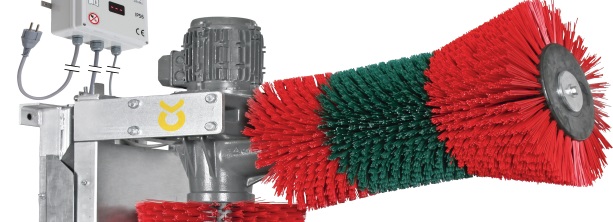
Wellness in the barn
In modern barns the cows roam freely. Farmers invest in cow cleaners on the one hand to increase their comfort factor, and on the other to be able to avail of the EU funding. They have to be insensitive to dirt and dust. A lubricant-free flange bearing permanently safeguards the required motion profile at a central position and ensures maximum service life.
"Anyone looking for a calf hutch for the farm or a rabbit hutch in an alpine hut setting, will find it with us," says Martin Lechner, responsible for product development of the Albert Kerbl GmbH in Buchbach. With approximately 400 employees, the producer and wholesaler specialises on products around farms and barns, riders and horses, pets and fences and is active virtually worldwide. But its own developments, especially in the agricultural sector, have also always played a central role.
Standard bearings for cow cleaners
In early 2013, the family-run company developed its own product, a ready-to-plug-in cow cleaner on the market. For mounting a shaft end of a brush, a rugged igubal flanged bearing EFOM, a standard construction element of igus GmbH, is used. It consists of a housing made of igumid G; its characteristic is the extreme impact resistance and a spherical cap made of the highly wear-resistant material iglidur W300. It has the lowest coefficient of friction in dry operation. igubal is a system of self-aligning bearing elements completely made of high-performance plastic. The type series ranges from rod end bearings and clevis joints up to flange bearings, spherical bearings and pillow block bearings. The bearing elements are very light, save installation space by their dimensions and save costs: first in procurement and second in operation by the saving of maintenance and installation costs.
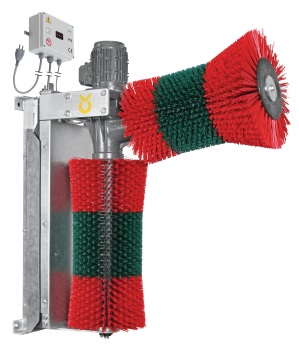
Fully automatic cow cleaners. It is used at least for seven hours every day. (Source: Albert Kerbl GmbH)
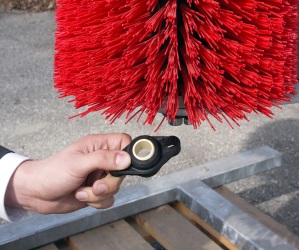
Fully automatic cow cleaners. The maintenance-free flange bearing at the bottom side absorbs the rotational movements. (Source: igus GmbH)
Maintenance-free electric cattle scratching brush
If a barn is newly built in Germany it almost always is a playpen. Its feature is that the animals can move freely and are no longer tethered. A component of these barns are often cow cleaners that are installed for reasons of animal welfare and comfort for the animals and supported in some countries by appropriate grants. A group of 50 to 60 animals get a scratching brush. Cows have the need to scratch and scrub themselves. Thus they clean themselves and rid themselves of parasites, lichens and mites. The brushing activates and stimulates the blood circulation. Calculations have shown that the scratching brushes are used at least seven hours per day.
This fully automated 'Cow Cleaner DUO' is a double-brush system. The vertical brush is almost the equivalent of the tree trunk and is used very intensively. The advantage of the double brush is that the cow can not only scrub and scratch the side and the back, but also its neck. "Cows can also be angry. If the system doesn't work right away, they will become ruthless and attack the machine," Lechner points out. It is therefore very important to use a rugged overall design for the cattle scratching brush.
Stresses from ammonia vapour up to straw dust
Activating the brush is easy. They are mounted on a kind of carriage system. If it is lifted by a few centimetres, the brushing process starts and runs for 60 seconds. During the cleaning process, the entire brush is constantly moved up and down by the animals. In addition there is the force of the cows, which permanently act on the system. Making an accurate calculation is very difficult in reality. The industry relies basically on experience and testing. Ammonia vapour, cow hair, as well as hay and straw dust in the barn moreover act on all the components. If the brush system is mounted outdoors, the effects of weather is also added. "After a week of use you will not recognise the machine again," confirms the product developers.
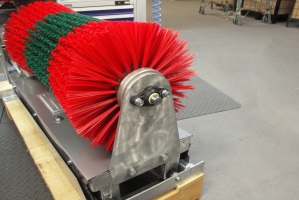
Assembled on site. Flange bearing for fully automatic cow cleaner. (Source: igus GmbH)
The lubricant-free flange bearing made of plastic is installed with two mounting holes at the bottom side of the cow cleaner. It reliably accommodates the rotational movements. It is resistant against vapours, fine dust and coarse dirt. In addition, there is the UV resistance. "In these aggressive ambient conditions metallic ball bearings seize up immediately. Stoppage is pre-programmed," says the technical sales consultant from igus, Thomas Weber. "Dirt increases wear. Due to the freedom from lubricants nothing can however stick on the bearing, which would have an impact on the holding times and the service life. “
Another big advantage in this application is that a precise alignment of the bearing housing is not required, as the flange bearing compensates for misalignment autonomously. The gear is fixed at the top. Since the holder for the gear cannot always be the same, the angle of the shaft to the carriage may possibly also be different. This is balanced by the angle compensation of the igus bearing. "If this angle compensation was not used, we would have to pose much greater demands on the dimensional accuracy of the welding work and possibly re-mill it," says Lechner. "This should be avoided for reasons of cost. “
Harmonious online presence
Due to the adverse conditions of use, corrosion-resistant polymer bearings are basically state of the art in cow cleaners. "When we took the decision internally to construct a fully automated cattle scratching brush, it was clear from the outset that we would also be relying on the design and operational advantages of the material plastic," Lechner recalls.
Here, the advanced selection and configuration tools available online on the igus website, played a major role. Although no stress exposure data was available for calculation, the product developer quickly found the right solution. Even the unit price was available online immediately, so that a rough cost estimate could be presented already as part of the product development. A standard machine element available from stock was used.
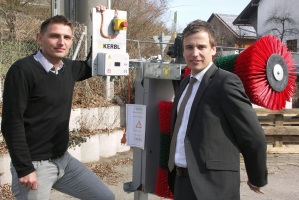
From left: Martin Lechner (Albert Kerbl GmbH), Thomas Weber (igus GmbH). (Source: igus GmbH)
A total of five test machines were built, sampled with the maintenance-free flange bearings and put to use in the real application. All are still running today without any problems. Meanwhile, hundreds of cow cleaners are in use in barns throughout Europe. Lechner clarifies this in conclusion: "For a minimum expected service life of five years, we will always resort to the lubricant-free plain bearing technology for future developments with bearings. It ensures the maximum performance and a long service life under the toughest conditions. “
 igubal® product overview
igubal® product overview
igubal® self-aligning maintenance-free spherical bearings made of high-performance polymers
dry-tech® laboratory
The dry-tech® test lab conducts more than 135 trillion test motions annually.
igubal® spherical bearings application examples
Overview of igubal® spherical bearing applications


